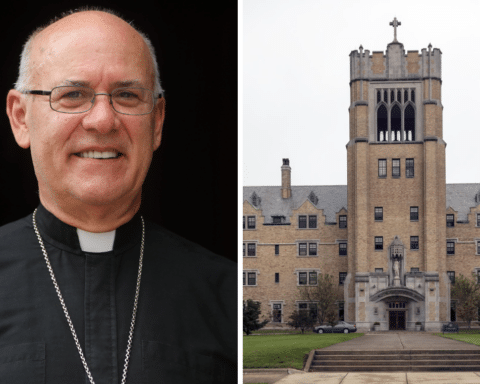Business, as seen through the lens of the Church’s social teaching, is how Catholic entrepreneurs, CEOs, corporate executives, small business owners and finance professionals work out their salvation in the world.
“The idea is that people who choose business as a profession need to understand they’re being called by God to do this,” said Brian T. Engelland, the associate dean of academics at The Catholic University of America’s Busch School of Business.
Engelland noted how freshmen in the business school are required to take a course on “business as a vocation,” taught by Andreas Widmer, a former Swiss Guard and entrepreneur who founded a nonprofit that promotes free enterprise solutions to addressing poverty.
“When you look at business that way, it leaves a big impression on young people,” Engelland told Our Sunday Visitor. “And if you understand business as a vocation, then you’re not doing it for yourself. You’re doing it for God.”
Formation
Catholic colleges and universities are forming the next generation of business leaders by offering comprehensive degree programs with classes that cover practical subjects such as product quality control, global supply chains, economics, international markets and business management principles, among other subjects.
But students are also learning about the ethical and spiritual dimensions of a business career. In that understanding, a business’ main purpose is to serve the common good and be of service to employees, vendors, customers, clients, communities and shareholders. Profit, while necessary for a business’s survival, is understood almost like a happy byproduct of doing the right thing by people.
“What I usually point out to my students is that if you do a really good job in creating value for your customers, employees and local communities, the profits will generally follow,” said Joseph Holt, a professor who teaches a graduate-level course on the spirituality of work in the University of Notre Dame’s Mendoza College of Business.
Well-being of others
Holt, a former corporate attorney who spent 12 years as a Jesuit, told Our Sunday Visitor that he emphasizes to his students that a business leadership career can be a “vocation of love,” if “love” is understood as having active concern for the well-being of others.
“Sometimes you manage a group of people, and you like some of them more than you like others, but you have to be concerned for the well-being of all of them,” said Holt, who added that his students are often surprised, and happy, to learn that lesson.
Holt said: “If what motivates you in your business career is an active concern for the well-being of your employees, your customers and your shareholders, and people living in the communities where you operate, that is an act of love. It’s a living out of the central Christian commandment.”
Profits with honor
At Loyola University Chicago’s Quinlan School of Business, students study the root causes and wider effects of income inequality, the different worlds that the rich and the poor inhabit, sustainability and the importance of environmental stewardship from a business perspective.
“We agree with Pope Francis that unbridled capitalism is a scourge, but we also preach, especially to our graduate and MBA students, that you can do well and do good in business,” said Kevin Stevens, the dean of the Quinlan School of Business.
Stevens told Our Sunday Visitor that the late Jesuit Father Raymond C. Baumhart, the former president of Loyola University Chicago, practically invented the field of business ethics when he wrote a seminal article in the late 1960s entitled, “Can You Have Profits with Honor?”
“Our answer is a resounding ‘yes,'” said Stevens, who added that businesses have lifted more than a billion people around the world out of abject poverty in recent years. And with governments looking to cut back on social services, Stevens said businesses can fill the void.
“Who’s going to help lift people out of poverty?” Stevens said. “Business has the resources to do that, and if we don’t, then shame on us.”
Ethics
That type of mission-driven business plan is consistent with the ethos that permeates the Satish and Yasmin Gupta College of Business at the University of Dallas.
“Our mission statement says we’re going to create leaders of principle and moral leaders who are also ethical and effective decision-makers,” said J. Lee Whittington, a professor of management at the Satish and Yasmin Gupta College of Business.
Whittington told Our Sunday Visitor that ethics is woven into every course in the business program.
“You could be taking a supply chain course, a marketing course, a leadership course, and in every course we teach, we will specify in the syllabus how, in that particular course, we’re going to address the relevant ethical issues,” said Whittington, who highlighted a basic but important principle that everyone in a business — suppliers, vendors and employees — should be treated with respect.
“First, it’s the right thing to do,” Whittington said. “And from a pragmatic business perspective, it’s the right thing to do to have a sustainable business over time. If you start taking ethical shortcuts, the long-term sustainability of the business is going to be compromised.”
The pressures to meet quarterly sales goals, satisfy shareholders, increase market share and compete in a global economy often present temptations to cut corners and compromise ethics. The character formation that is part of a Catholic liberal arts education is designed to help students understand the importance of behaving ethically.
“It may not catch up with you today or tomorrow, but not being ethical will catch up with you,” Whittington said, adding that the aim of business ethics is not just to help business leaders avoid heavy fines or jail time, but to honor God and serve people.
“And it just makes good business sense to do that,” Whittington said.
Academic perspective
At the College of the Holy Cross in Worcester, Massachusetts, students also study business, but from a more academic perspective.

“We’re not really teaching practical business skills like they would teach at a business program. Instead what we’re doing is a liberal arts study of the institution of business, which has its own anthropology, its own literature and its own culture,” said Kendy M. Hess, director of the Ciocca Center for Business, Ethics, and Society at the College of the Holy Cross.
Hess told Our Sunday Visitor that the study of business is an important discipline given how the international preference for a market-based society has developed over the last two to three centuries.
“In many ways, our nation-states are not really held together by religion and language anymore. They’re really held together by the market,” Hess said. “Business is an institution that engages most directly with the market, and it can have an extraordinary impact on everybody in society, and in society itself. It’s crucial that we talk about that fact.”
Hess added that academia, in general, has hesitated to study business because business often is seen as too practical, even “dirty.” But with extensive social science research that shows how business impacts everything from religion to immigration and government, Hess said it is a subject ripe for further study.
Liberal arts
“The reluctance to study business has sent a message to students that liberal arts is highbrow and really has nothing to do with business,” Hess said. “But really I want (students) to understand that their liberal arts education is extremely relevant to how they will be in business, and the kind of businesses that they will enact.”
At the University of Dallas, Whittington said faculty members wanted to embrace the liberal arts and the university’s Catholic identity when they formed the business school’s undergraduate program. He said the business students take more philosophy and theology classes than most other students on campus.
“At the University of Dallas, you’re not getting a business degree that has watered down the liberal arts. In fact, you’re getting more of the liberal arts,” Whittington said.
Holt, from the University of Notre Dame’s business school, said “one of the big questions” he asks his business students every semester to think about is how they define success in life.
“We spend a lot of time pondering that question, because there are a lot of false messages out there about what constitutes success that I think are inadequate from a faith standpoint,” Holt said. “We can all think of people who have wealth, fame and position who we would not consider as successful in life as a whole.”
Holt added that a career in business can be an important opportunity to evangelize and do good in the world for Catholic professionals.
“If the Lord wants his kingdom established everywhere,” Holt said, “Then there have to be people everywhere doing something to make it happen.”
Brian Fraga is a contributing editor for Our Sunday Visitor.
| BUSINESS AS AN OPPORTUNITY FOR ‘CHRISTIAN WITNESS’ |
|---|
|
“I am well aware that it is not easy in daily life to reconcile the demands of faith and the social teaching of the Church with the needs and constraints imposed by the laws of the market and of globalization. But I believe that the evangelical values that you wish to implement in the management of your businesses, as well as in the many relationships that you have within the framework of your activities, are an opportunity for genuine and indispensable Christian witness. …
“In this, you may sometimes feel powerless. And yet you have an essential role to play. Because, even in a modest way, in some concrete changes of habits and style, whether in relationships with your direct collaborators, or even better in the dissemination of new corporate cultures, it is possible for you to take action to change things tangibly and, little by little, to educate the world of work in a new style.” — Pope Francis, in a speech to business leaders and entrepreneurs on Dec. 2, 2019 |





